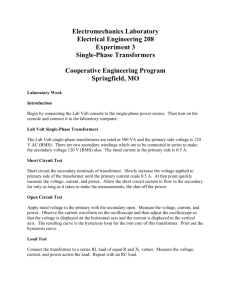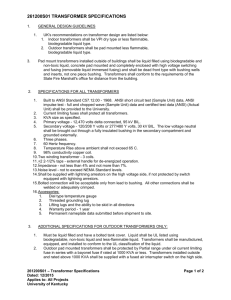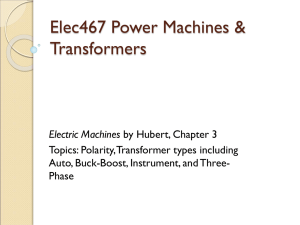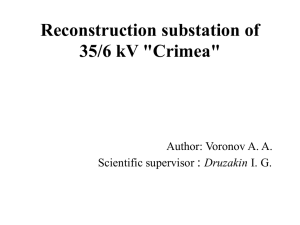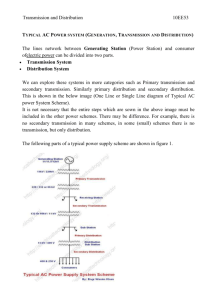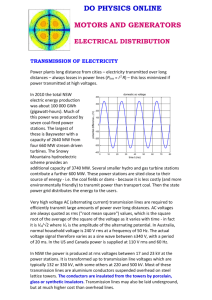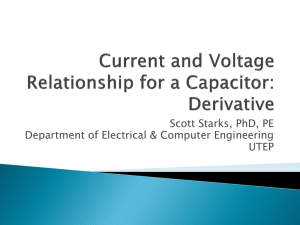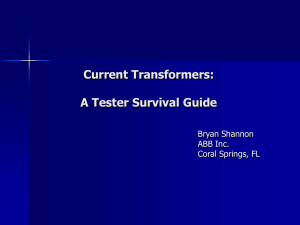26 12 00 Medium Voltage Transformers
advertisement
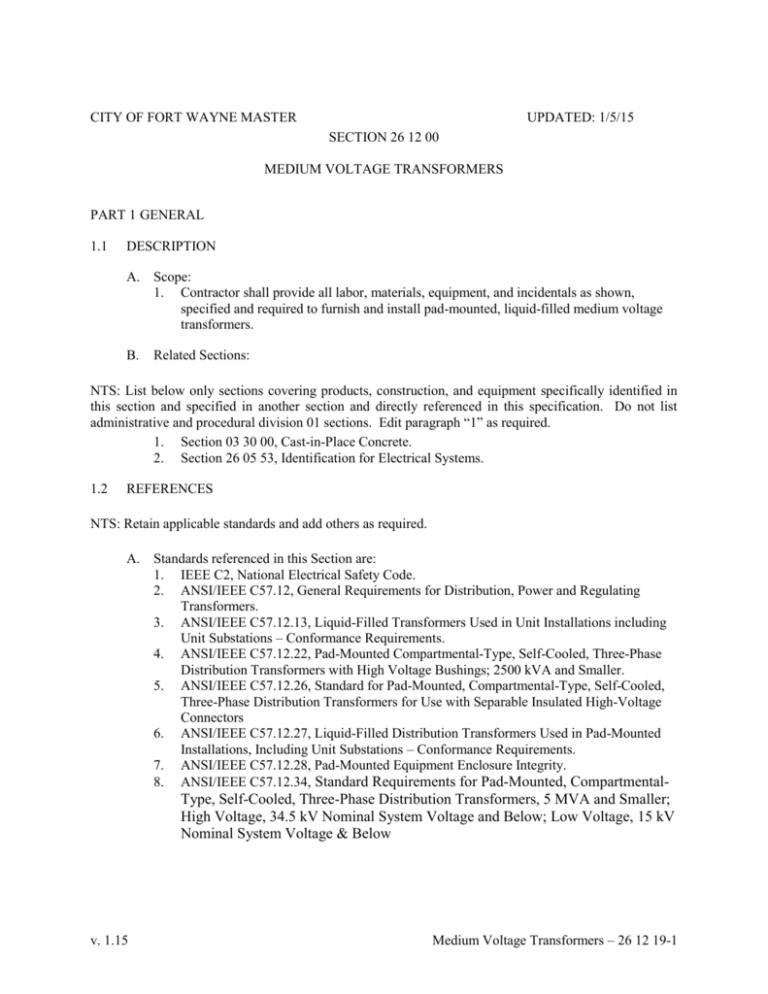
CITY OF FORT WAYNE MASTER UPDATED: 1/5/15 SECTION 26 12 00 MEDIUM VOLTAGE TRANSFORMERS PART 1 GENERAL 1.1 DESCRIPTION A. Scope: 1. Contractor shall provide all labor, materials, equipment, and incidentals as shown, specified and required to furnish and install pad-mounted, liquid-filled medium voltage transformers. B. Related Sections: NTS: List below only sections covering products, construction, and equipment specifically identified in this section and specified in another section and directly referenced in this specification. Do not list administrative and procedural division 01 sections. Edit paragraph “1” as required. 1. Section 03 30 00, Cast-in-Place Concrete. 2. Section 26 05 53, Identification for Electrical Systems. 1.2 REFERENCES NTS: Retain applicable standards and add others as required. A. Standards referenced in this Section are: 1. IEEE C2, National Electrical Safety Code. 2. ANSI/IEEE C57.12, General Requirements for Distribution, Power and Regulating Transformers. 3. ANSI/IEEE C57.12.13, Liquid-Filled Transformers Used in Unit Installations including Unit Substations – Conformance Requirements. 4. ANSI/IEEE C57.12.22, Pad-Mounted Compartmental-Type, Self-Cooled, Three-Phase Distribution Transformers with High Voltage Bushings; 2500 kVA and Smaller. 5. ANSI/IEEE C57.12.26, Standard for Pad-Mounted, Compartmental-Type, Self-Cooled, Three-Phase Distribution Transformers for Use with Separable Insulated High-Voltage Connectors 6. ANSI/IEEE C57.12.27, Liquid-Filled Distribution Transformers Used in Pad-Mounted Installations, Including Unit Substations – Conformance Requirements. 7. ANSI/IEEE C57.12.28, Pad-Mounted Equipment Enclosure Integrity. 8. ANSI/IEEE C57.12.34, Standard Requirements for Pad-Mounted, Compartmental- Type, Self-Cooled, Three-Phase Distribution Transformers, 5 MVA and Smaller; High Voltage, 34.5 kV Nominal System Voltage and Below; Low Voltage, 15 kV Nominal System Voltage & Below v. 1.15 Medium Voltage Transformers – 26 12 19-1 9. 10. 11. 12. 13. 14. 1.3 ANSI/IEEE C57.12.90, Test Code for Distribution Power and Regulation Transformers and Guide for Short Circuit Testing of Distribution and Power Transformers. ANSI/IEEE C57.12.91, Test Code for Dry-Type Distribution and Power Trans-formers. NEC 450, Transformers and Transformer Vaults NEMA LA 1, Surge Arresters UL 486A, Standard for Safety for Wire Connectors and Soldering Lugs for Use With Copper Conductors UL 486B, Standard for Safety for Wire Connectors for Use with Aluminum Conductors QUALITY ASSURANCE A. Testing Agency Qualifications: Independent testing agency shall meet OSHA criteria for accreditation of testing laboratories, Title 29, Part 1907; or shall be full-member company of International Electrical Testing Association. 1. Testing Agency's Field Supervisor: Person currently certified by International Electrical Testing Association or National Institute for Certification in Engineering Technologies, to supervise on-site testing. B. Regulatory Requirements: Comply with the following: NTS: Retain applicable regulations and add others as required. 1. NEC Article 450, Transformers and Transformers Vaults (Including Secondary Ties). 2. United States Department of Energy, 10 CFR Part 431, Energy Conservation. 3. National Electrical Code (NEC): Components and installation shall comply with National Fire Protection Association (NFPA) 70. 4. IEEE C2. Institute of Electrical and Electronics Engineers National Safety Code NTS: Retain paragraph “C”, below when seismic requirements apply; otherwise delete. Coordinate with the project structural Engineer to determine project seismic requirements. C. 1.4 Seismic Requirements: The Work shall comply with seismic Zone 1Requirements and Site Class as determined by geotechnical evaluation. SUBMITTALS A. Submit the following: 1. Shop Drawings: a. Transformer layout including dimensions and locations of anchors. 2. Product Data: a. Manufacturer's technical information for proposed pad-mounted, liquid-filled medium voltage transformers. Include data on features, components, ratings, and performance for each type of transformer specified. Include dimensioned plans, sections, and elevation views. b. Anchorage system information with load calculations and installation information. c. Show minimum clearances and installed devices and features. 3. Testing Plans, Procedures, and Testing Limitations: a. Proposed factory test methods, procedures, and apparatus. v. 1.15 Medium Voltage Transformers – 26 12 19-2 4. 5. 6. 7. 8. 9. 1.5 b. Proposed field test methods, procedures, and apparatus. Wiring Diagrams: Detail wiring and identify terminals for tap changing and connecting field-installed wiring. Certifications: a. Seismic certification Source Quality Control Submittals: a. Submit transformer factory test reports. Field Quality Control Submittals: a. Submit transformer field test reports Qualifications Statements: a. Manufacturer, when requested by Engineer Submit Operation and Maintenance Data in accordance with Section 01 78 23. DELIVERY AND HANDLING A. Equipment shall be constructed for handling by crane. Where cranes are not available equipment shall be suitable for placement on rollers using jacks to raise and lower the groups. B. Temporary Heating: For indoor, dry-type transformers, apply temporary heat according to manufacturer's written instructions within enclosure of each ventilated-type unit throughout periods during which equipment is not energized and is not in space that is continuously under normal control of temperature and humidity. C. Delivery, storage, and handling shall comply with manufacturer’s recommendations. PART 2 PRODUCTS 2.1 EQUIPMENT PERFORMANCE A. Performance Criteria: 1. Reference Construction Drawings for applicable medium voltage transformers information. Information includes but is not limited to KVA, primary and secondary voltages. 2. Description: 2-winding type, designed for operation with high-voltage windings connected to 3-phase, 3-wire, 60 Hz, grounded-neutral distribution system 2.2 MANUFACTURERS NTS: Insert at No. 1, No. 2, and No. 3 the appropriate model numbers. A. Products and Manufacturers: Provide one of the following: 1. Cooper Industries; Cooper Power Systems Division. 2. ABB Power T & D Co., Inc. 3. Or equal. 2.3 MATERIALS v. 1.15 Medium Voltage Transformers – 26 12 19-3 A. Material Requirements: 1. ANSI/IEEE C57.12.00, C57.12.26, C57.12.28, and C57.12.34. 2. Dielectric Liquid: Envirotemp FR3 Fluid, listed as less-flammable, non-toxic, nonbioaccumulating, biodegradable per EPA, 100% derived from seed oils and food grade performance enhancing additives. The fluid shall be Factory Mutual (FM) approved and UL classified. 3. Efficiency: Energy efficient, complying with 10 CFR Part 431 standard efficiency levels. 4. Windings: a. Copper construction for primary and secondary windings. b. Winding temperature rise by resistance shall not exceed 55 degrees C. c. Hottest spot winding temperature rise shall not exceed 65 degrees C. d. Provide thermally upgraded insulation allowing continuous loading of 112 percent of the 55 degrees C KVA rating with winding temperature rise not exceeding 65 degrees C and hottest spot temperature rise not exceeding 80 degrees C. 5. Full-Capacity Voltage Taps: Four 2.5% taps; 2 above and 2 below rated high voltage; with externally operable tap changer for de-energized use and with position indicator and padlock hasp. 6. Liquid-filled medium voltage Transformers shall bear the UL label. 7. Impedance: 5.75 percent. B. v. 1.15 Construction Requirements: 1. Live-front construction. 2. Construction shall be in accordance with ANSI/IEEE C57.12.13, ANSI/IEEE C57.12.22, ANSI/IEEE C57.12.27, and ANSI/IEEE C57.12.28. 3. Compartmental-type unit consisting of transformer tank with high and low-voltage cable terminating compartment, assembled as an integral unit for mounting on a pad. 4. Tamper-proof design with no exposed screws, bolts, or other fastening devices that are externally removable, and no openings through which foreign objects might contact live parts. 5. Full-height, air-filled, incoming and outgoing terminal compartments with hinged doors and steel barrier between compartments: a. High-voltage, incoming compartment accessible only after door to low-voltage, outgoing compartment is open. b. Compartment doors equipped for latching in the open position and capable of being secured with a single padlock. c. Door hardware and hinge assemblies made of corrosion-resistant material. 6. Lifting, jacking, and rolling provisions. 7. Instruction Nameplate: Stainless steel plate and screws permanently affixed to a nonremovable part in the low-voltage compartment and located to be readable with cables in place. 8. Transformer Tank: Sealed tank constructed with welded main cover and bolted tamperresistant handhole for access to internal connections. 9. Tank grounding provisions in high-and low-voltage compartments. 10. Low-voltage Bushings: Tinned, spade type. 11. High-voltage Bushings: Porcelain, live-front arrangement. 12. High-voltage Entrance: Three cast resin bushings with phase barriers between bushings. 13. Terminals arranged for cabling from below. Medium Voltage Transformers – 26 12 19-4 14. Identification: Identify pad-mounted liquid-filled medium voltage transformers in accordance with Section 26 05 53, Identification for Electrical Systems, with transformer identification number, primary and secondary power identification, and voltage. C. Surge Arrester Requirements: 1. Distribution class, one for each primary phase. 2. Comply with NEMA LA 1. D. High-Voltage Termination and Equipment Requirements: 1. Dead front deadbreak. 2. Include following: a. Deadbreak primary one-piece 600A bushing externally removable integral design. b. Suitable for use with 600A T-tap deadbreak connector with 200A loadbreak interface and capacitive test point. 3. 4. Parking Stands: One for each high-voltage connector. Arranged for parking deadbreak connectors; one for each primary feeder conductor terminating at transformer. Surge Arresters: Dead-front, 200A, elbow-type, metal-oxide-varistor units suitable for use on 200A loadbreak interface on the 600A T-tap dedbreak connectors. NTS: Edit as required for other accessories and primary and secondary switching equipment. E. Required Accessories: 1. Lightning arrester mounting pads with three lightning and surge over voltage arrestors 2. Gang-operated internal oil-immersed load break switch with bayonet primary expulsion fuses. 3. Drain Valve: 1 in. (25 mm), with sampling device. 4. Dial-type thermometer. 5. Liquid-level gauge. 6. Pressure-vacuum gauge. 7. Pressure-Relief Device: Self-sealing with an indicator. NTS: Delete “8” below if alarms are not necessary for the project. Coordinate alarms with Owner. 8. Alarm contacts for above gages and thermometer, including but not limited to; a. Oil Pressure Low b. Oil Pressure High c. Temperature Low d. Temperature High e. Oil Level Low f. Oil Level High F. 2.4 Finish Requirements: 1. Enclosure Coating System for Outdoor Units: Comply with ANSI C57.12.28 regardless of transformer type. SOURCE QUALITY CONTROL v. 1.15 Medium Voltage Transformers – 26 12 19-5 A. Factory Tests for Liquid-Filled Medium Voltage Transformers: Perform the following factory tests in accordance with ANSI/IEEE C57.12.90 and ANSI/IEEE C57.12.91: 1. Resistance measurements of all windings on rated voltage connection of each unit and at tap extremes of one unit of each specified rating. 2. Ratio tests on rated voltage connection and on all tap connections. 3. Polarity and phase-relation tests on rated voltage connection. 4. No-load loss at rated voltage on rated voltage connection. 5. Exciting current at rated voltage on rated voltage connection. 6. Impedance and load loss at rated current on rated voltage connection of each unit and on the tap extremes of one unit of each specified rating. 7. Temperature Test: Perform tests when there is no available record of a temperature test made in accordance with ANSI/IEEE standards on a duplicate or essentially duplicate unit to the equipment required. Perform tests under conditions specified in ANSI/IEEE C57.12.90 on one unit of each specified rating. 8. Applied potential tests. 9. Induced potential tests. B. Factory Sound-Level Tests: Conduct sound-level tests on equipment for this Project if specified sound levels are below standard ratings. PART 3 EXECUTION 3.1 INSPECTION A. Examine conditions under which the Work will be installed and notify Engineer in writing of conditions detrimental to the proper and timely completion of the Work. Do not proceed with the Work until unsatisfactory conditions are corrected. 3.2 INSTALLATION A. Install equipment in accordance with equipment manufacturer’s recommendations, Laws and Regulations, and the Contract Documents. B. Install equipment with sufficient access and working for convenient and safe operation and maintenance. C.Tighten electrical connectors and terminals according to manufacturer's published torquetightening values. If manufacturer's torque values are not indicated, use those specified in UL 486A and UL 486B. NTS: Edit paragraph “D” below if special anchor detail is required. D. Install transformer on concrete pad at location shown on the Drawings. Modify pad as required to fit equipment furnished. Provide pad in accordance with Section 03 30 00 Cast-inPlace Concrete. Anchor transformer per manufacturer recommendations. E. v. 1.15 Set taps for proper voltage at service distribution equipment. Medium Voltage Transformers – 26 12 19-6 F. 3.3 Unless otherwise shown or indicated, provide ground rod directly beneath transformer. Connect grounding electrode conductor(s) to ground rod. Where liquid-filled medium voltage transformers are to be mounted on existing concrete slabs, drill slab for ground rod penetration. FIELD QUALITY CONTROL NTS: Edit inspection and testing requirements in paragraph “A”, below, to suit the project. A. TRANSFORMERS – OIL FILLED 4,160 – 480/277 v 1. Tests: Include following minimum inspections and tests according to manufacturer's written instructions. Comply with IEEE C57.12.90 for test methods and data correction factors for liquid-filled units. a. b. c. Inspect accessible components for cleanliness, mechanical and electrical integrity, and damage or deterioration. Verify that temporary shipping bracing has been removed. Include internal inspection through access panels and covers for dry-type transformers. Inspect bolted electrical connections for tightness according to manufacturer's published torque values or, if not available, those specified in UL 486A and UL 486B. Insulation Resistance: Perform megohmmeter tests of primary and secondary winding to winding and winding to ground. 1) 2) 3) d. e. f. g. h. Duration of Each Test: 10 min. Temperature Correction: Correct results for test temperature deviation from 20°C standard. Turns Ratio: Measure between windings at each tap setting. Measured ratios deviating more than 0.5% from calculated or measured ratio for an adjacent coil are not acceptable. Winding Resistance: Measure for windings at nominal tap setting. Measured resistance deviating more than 1% from that of adjacent windings is not acceptable. Liquid-Filled Transformer, Insulation Power-Factor Test: Determine overall dielectric loss and power factor for windings' insulation. Limit test voltage to lineto-ground voltage of windings being tested. Measured values exceeding following are not acceptable: 1) v. 1.15 For Windings' Ratings from 0 to 600 V: 1000-V, dc minimum test voltage; and 500 megohms for dry-type and 100 megohms for liquid-filled transformers. For Windings' Ratings from 601 to 5000 V: 2500-V, dc minimum test voltage; and 5000 megohms for dry-type and 1000 megohms for liquid-filled transformers. For Windings' Ratings from 5000 to 35,000 V: 5000-V, dc minimum test voltage; and 25,000 megohms for dry-type and 5000 megohms for liquid-filled transformers. Oil-Filled Units: 1%. Medium Voltage Transformers – 26 12 19-7 2) 3) 2. 3.4 Silicone-Filled Units: 0.5%. High-Fire-Point, Hydrocarbon-Filled Units: 1%. Test Failures: Compare test results with specified performance or manufacturer's data. Correct deficiencies identified by tests and retest. Verify that transformers meet specified requirements. FIELD QUALITY CONTROL A. Manufacturer's Field Services: 1. Furnish the services of qualified factory-trained technicians from manufacturer to instruct facility operations and maintenance personnel in recommended operation and maintenance of the equipment. Training requirements and duration of instruction shall be in accordance with Section 01 79 23, Instruction of Operations and Maintenance Personnel. 2. Supplier's or manufacturer's representative for equipment specified herein shall be present at jobsite or classroom designated by OWNER for mandays indicated, travel time excluded, for assistance during plant construction, plant startup, and training of OWNER'S personnel for plant operation. Include: a. 1 man-day for Installation Services. b. 1/2 man-day for Instructional Services. 3. In addition to services specified above, furnish manufacturer’s field services as required to successfully complete system demonstration testing as specified Section 01 79 13 – System and Facility Performance Testing Procedures. B. 3.5 Instructional Services: 1. Factory-authorized service representative shall explain transformers and accessories and to train Buyer’s maintenance personnel. Provide both classroom training and hands-on equipment operation covering following: a. Safety precautions. b. Features and construction of project transformers and accessories. c. Routine inspection, test, and maintenance procedures. d. Routine cleaning. e. Features, operation, and maintenance of integral disconnect switches and protective devices. f. Interpretation of readings of indicating and alarm devices. g. Tap-changing procedures. h. Features, operation, and maintenance of separable, insulated, connector system. CLEANING A. On completion of installation, inspect components. Remove paint splatters and other spots, dirt, and debris. Repair scratches and mars on finish to match original finish. Clean components internally using methods and materials recommended by manufacturer. 3.6 ADJUSTING A. After installing and cleaning, touch up scratches and mars on finish to match original finish. v. 1.15 Medium Voltage Transformers – 26 12 19-8 B. Adjust transformer taps to provide optimum voltage conditions at utilization equipment throughout normal operating cycle of facility. Record primary and secondary voltages and tap settings and submit with test results. + + END OF SECTION + + v. 1.15 Medium Voltage Transformers – 26 12 19-9
